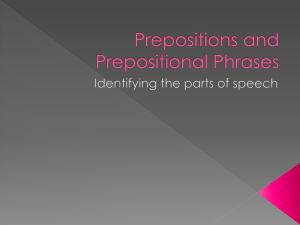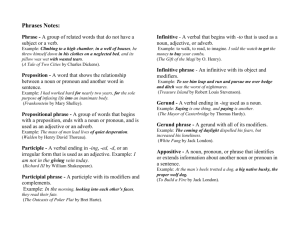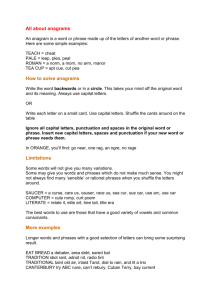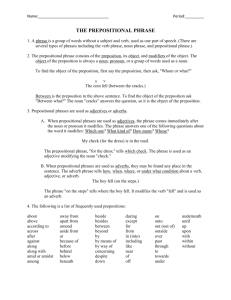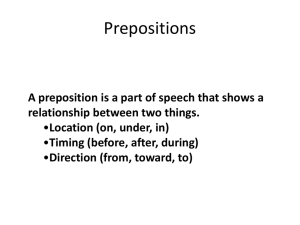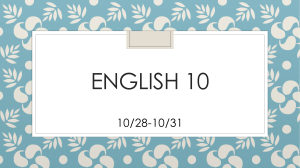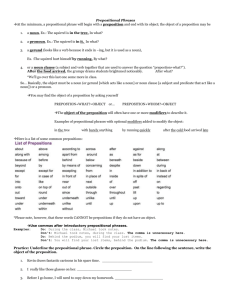infinitive phrase
advertisement
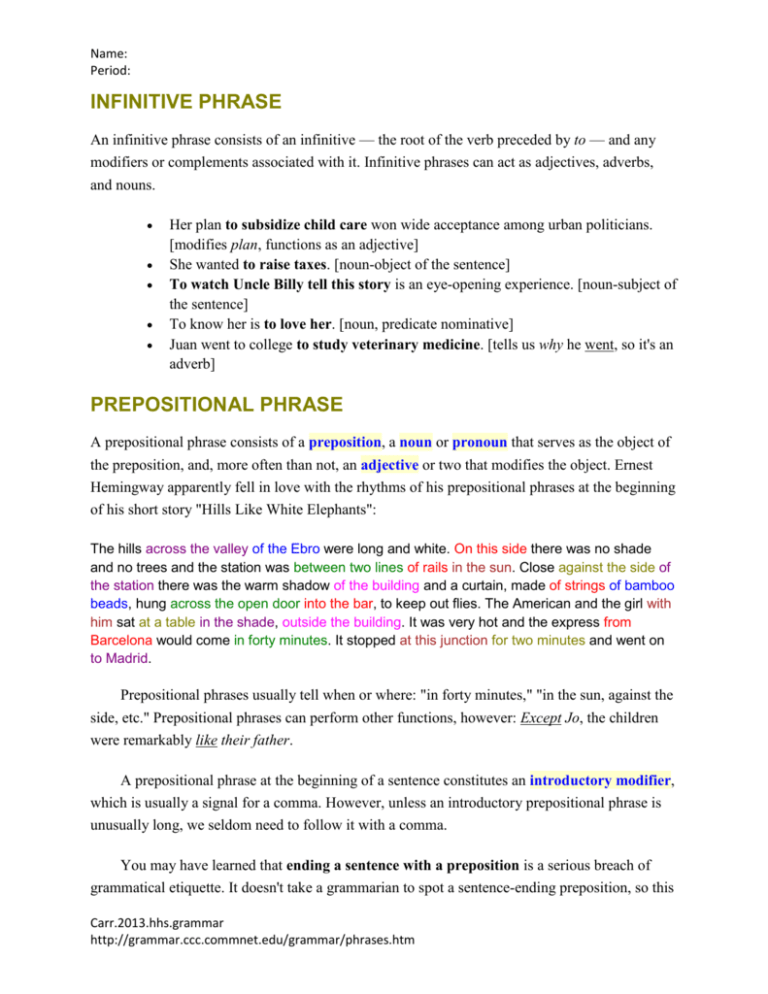
Name: Period: INFINITIVE PHRASE An infinitive phrase consists of an infinitive — the root of the verb preceded by to — and any modifiers or complements associated with it. Infinitive phrases can act as adjectives, adverbs, and nouns. Her plan to subsidize child care won wide acceptance among urban politicians. [modifies plan, functions as an adjective] She wanted to raise taxes. [noun-object of the sentence] To watch Uncle Billy tell this story is an eye-opening experience. [noun-subject of the sentence] To know her is to love her. [noun, predicate nominative] Juan went to college to study veterinary medicine. [tells us why he went, so it's an adverb] PREPOSITIONAL PHRASE A prepositional phrase consists of a preposition, a noun or pronoun that serves as the object of the preposition, and, more often than not, an adjective or two that modifies the object. Ernest Hemingway apparently fell in love with the rhythms of his prepositional phrases at the beginning of his short story "Hills Like White Elephants": The hills across the valley of the Ebro were long and white. On this side there was no shade and no trees and the station was between two lines of rails in the sun. Close against the side of the station there was the warm shadow of the building and a curtain, made of strings of bamboo beads, hung across the open door into the bar, to keep out flies. The American and the girl with him sat at a table in the shade, outside the building. It was very hot and the express from Barcelona would come in forty minutes. It stopped at this junction for two minutes and went on to Madrid. Prepositional phrases usually tell when or where: "in forty minutes," "in the sun, against the side, etc." Prepositional phrases can perform other functions, however: Except Jo, the children were remarkably like their father. A prepositional phrase at the beginning of a sentence constitutes an introductory modifier, which is usually a signal for a comma. However, unless an introductory prepositional phrase is unusually long, we seldom need to follow it with a comma. You may have learned that ending a sentence with a preposition is a serious breach of grammatical etiquette. It doesn't take a grammarian to spot a sentence-ending preposition, so this Carr.2013.hhs.grammar http://grammar.ccc.commnet.edu/grammar/phrases.htm Name: Period: is an easy rule to get caught up on (!). Although it is often easy to remedy the offending preposition, sometimes it isn't, and repair efforts sometimes result in a clumsy sentence. Based on shaky historical precedent, the rule itself is a latecomer to the rules of writing. Those who dislike the rule are fond of recalling Churchill's rejoinder: <"That is nonsense up with which I shall not put." We should also remember the child's complaint (attributed to E.B. White): "What did you bring that book that I don't like to be read to out of up for?" GERUND PHRASE Gerunds, verbals that end in -ing and that act as nouns, frequently are associated with modifiers and complements in a gerund phrase. These phrases function as units and can do anything that a noun can do. Notice that other phrases, especially prepositional phrases, are frequently part of the gerund phrase. Cramming for tests is not a good study strategy. [gerund phrase as subject] John enjoyed swimming in the lake after dark. [gerund phrase as object] I'm really not interested in studying biochemistry for the rest of my life. [gerund phrase as object of the preposition in ] Practice: Create sentences incorporating the specified phrase: 1. (Infinitive) ______________________________________________________________________________ ______________________________________________________________________________ 2. (Preposition) ______________________________________________________________________________ ______________________________________________________________________________ 3. (Gerund) ______________________________________________________________________________ ______________________________________________________________________________ Carr.2013.hhs.grammar http://grammar.ccc.commnet.edu/grammar/phrases.htm
